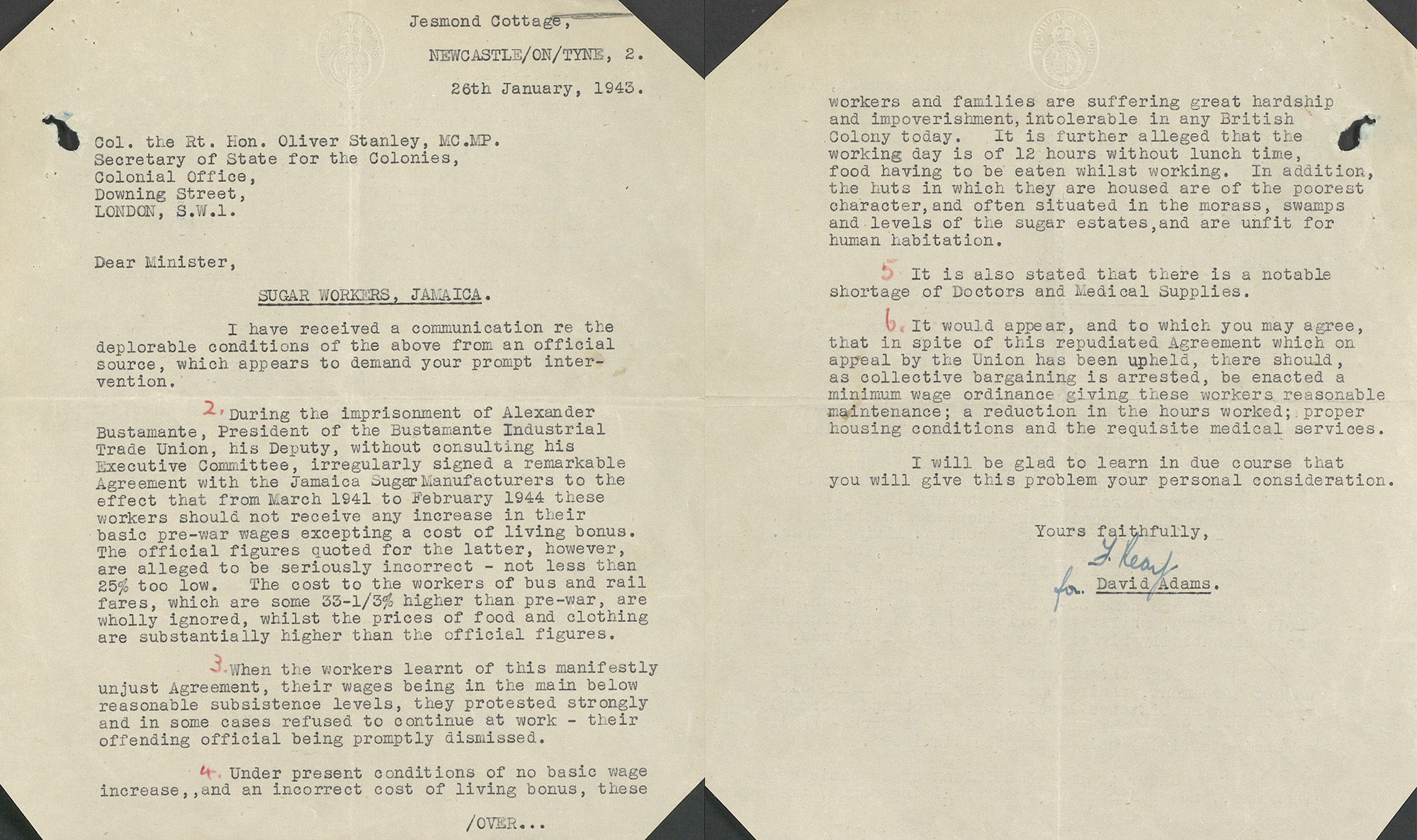
A letter sent to the Secretary of State for the Colonies concerning working conditions for sugar workers in Jamaica. 26 January 1943. Catalogue ref: CO 137/852/7
Alexander Bustamante was an important politician, trade unionist and critic of the colonial system. He spoke out about unemployment, low wages, and poor working conditions for Jamaicans in the 1920s and 1930s. In 1938 he founded the Bustamante Industrial Trade Union (BITU), previously known as The Jamaica Workers Union. He was imprisoned in September 1940 for an alleged violation of the Defence of the Realm Act and released February 1942. A year later he founded the Jamaica Labour Party (JLP) and became the first Prime Minister of Jamaica in 1962 when Jamaican gained independence.
- Why has this letter been sent to the Secretary of State for the Colonies?
- Find out more about the life and work of Alexander Bustamante here.
- Does this letter infer anything about the relationship between Britain and Jamaica?
Transcript
Jesmond Cottage
NEWCASTLE/ON/TYNE, 2
26th January 1943
Col. The Rt. Hon. Oliver Stanley, M.C.M.P.1
Secretary of State for the Colonies
Colonial Office
Downing Street,
LONDON, S.W.1
Dear Minister,
SUGAR WORKERS, JAMAICA.
I have received a communication re the deplorable conditions of the above from an official source, which appears to demand your prompt intervention.
During the imprisonment of Alexander Bustamante, President of the Bustamante Industrial Trade Union, his deputy without consulting his Executive Committee, irregularly signed a remarkable Agreement with the Jamaican Sugar Manufacturers to the effect that from March 1941 to February 1944 these workers should not receive any increase in their basic pre-war wages excepting a cost of living bonus. The official figures quoted for the latter, however, are alleged to be seriously incorrect- not less than 25% too low. The cost to the workers of bus and rail fares which are some 33-1/3% higher than pre-war, are wholly ignored, whilst the prices of food and clothing are substantially higher than the official figures.
When the workers learnt of this manifestly unjust Agreement, their wages being in the main below reasonable subsistence levels, they protested strongly and, in some cases, refused to continue to work- their offending official being permanently dismissed.
Under present conditions of no basic wage increase, and an incorrect cost of living bonus, these workers and families are suffering great hardship and impoverishment, intolerable in any British Colony today. It is further alleged that the working day is of 12 hours without lunch time, food having to be eaten whilst working. In addition, the huts in which they are housed are the poorest character, and often situated in the morass, swamps, and levels of the sugar estates, and are unfit for human habitation.
It is also stated that there is a notable shortage of Doctors and Medical Supplies.
It would appear, and to which you may agree, that in spite of this repudiated Agreement, which on appeal by the Union has been upheld, there should as collective bargaining is arrested, be enacted a minimum wage ordinance giving these workers reasonable maintenance; a reduction in the hours worked; proper housing conditions and the requisite medical services.
I will be glad to learn in due course that you will give this problem your personal consideration.
Yours faithfully
David Adams4
